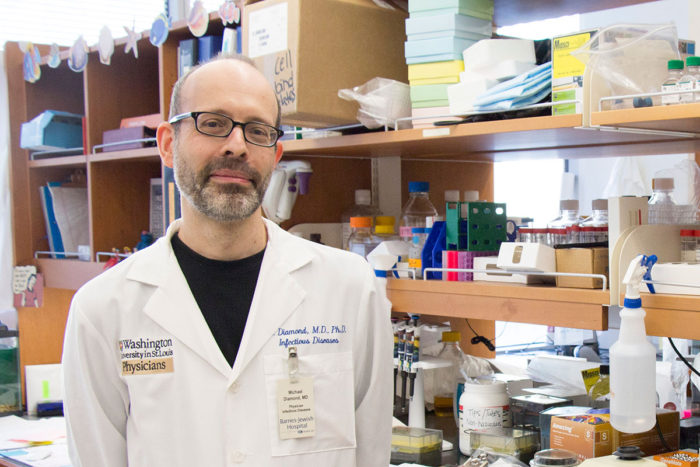Diamond named Gasser Professor of Medicine
Honor recognizes groundbreaking work on emerging viral infections
 E. Holland Durando
E. Holland DurandoMichael Diamond, MD, PhD, has been named the Herbert S. Gasser Professor of Medicine for his work on emerging viral diseases such as West Nile and Zika.
Michael Diamond, MD, PhD, recognized internationally for his research involving Zika and related viruses, has been named the Herbert S. Gasser Professor of Medicine at Washington University School of Medicine in St. Louis.
A professor of medicine, of molecular microbiology, and of pathology and immunology, Diamond studies viruses — such as West Nile, Zika, dengue and chikungunya — that are growing in importance because they are causing more cases of disease or spreading to new parts of the world. He seeks to understand how they cause illness and interact with and evade the immune system.
“Mike is a world-renowned scientist working on the frontlines of emerging infectious diseases, especially mosquito-borne viruses,” said Victoria J. Fraser, MD, the Adolphus Busch Professor of Medicine and head of the Department of Medicine. “His work in the laboratory is aimed at understanding how these viruses lead to disease so that effective treatments can be developed.”
Diamond is known for leading some of the groundbreaking initial studies into Zika virus, including why and how it causes devastating neurological damage to the developing fetus. With colleagues, Diamond developed the first animal model of Zika infection during pregnancy, showed that the virus can infect the eye, identified protective antibodies against the virus, showed that Zika infection reduces the fertility of male mice and developed a Zika vaccine that is now in clinical trials.
“Mike was one of the first to realize how important Zika was going to be,” said Herbert W. “Skip” Virgin IV, MD, PhD, the Mallinckrodt Professor and head of the Department of Pathology and Immunology. “His lab was able to quickly apply techniques and knowledge the team had developed studying other viruses, and in the process became one of the global leaders in Zika research.”
Diamond earned his bachelor’s degree in political science from Columbia University in 1985, followed by his medical and doctorate degrees from Harvard in 1994. After completing a research fellowship in molecular and cell biology at the University of California, Berkeley, Diamond moved across the bay to the University of California, San Francisco, where he completed his residency in internal medicine and a clinical fellowship in infectious disease. He returned to Berkeley to complete another research fellowship in infectious diseases in 2001, before joining the Washington University School of Medicine that year as a junior faculty member.
The Gasser professorship is one of four chairs endowed by John F. McDonnell, vice chairman of the Board of Trustees, and the JSM Charitable Trust Foundation as part of the university’s BioMed 21 initiative launched in 2006. BioMed 21 aims to promote the translation of basic science discoveries into real-world clinical solutions.
The chair was named for Herbert Gasser, a former head of the pharmacology department at the School of Medicine. Gasser won the Nobel Prize in physiology or medicine in 1944 jointly with his mentor Joseph Erlanger, a former head of the physiology department at the School of Medicine. Gasser and Erlanger studied the different functions of single nerve fibers. Their work led to advances in our knowledge of the mechanism of pain and of reflex action. Gasser used his prize money to fund further research into the subject.
Clay Semenkovich, MD, was the inaugural Gasser Professor. He is now the Irene E. and Michael M. Karl Professor of Endocrinology and Metabolism in Medicine.







